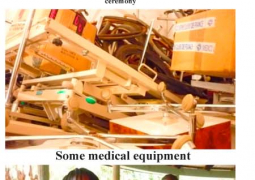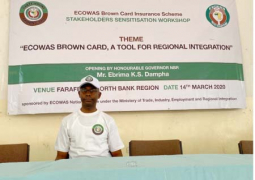Thirty-five students from the University of The Gambia Law Faculty recently concluded a four-day intensive paralegal training at NaNA Conference hall.
The training, which kick-started on Tuesday, was organised by National Agency for Legal Aid (NALA) in collaboration with the West African Law Institute, funded by the United Nations Development Programme (UNDP).
In his official opening statement, the executive director of NALA, Sanna Dahaba, said access to justice being a fundamental right on its own and one without which other rights such as the right to a fair trial cannot be realized, is at the epitome of human rights.
He said that over the years, the Government of The Gambia under the leadership of President Yahya Jammeh, in recognition of its international responsibility under the United Nations Charter on Human and Peoples Right as well as other obligations arising from various international human rights instruments to which The Gambia is a party, enacted the Legal Aid Act in 2008 to respond to the challenges posed by the Poor Persons Defense Act 1963, which only provided for legal aid and charged with capital offences.
He added that the Legal Aid Act 2008 established the National Agency for Legal Aid and charged it with the responsibility of providing legal aid to poor and vulnerable persons as well as the responsibility of synchronizing legal aid services delivery within the country.
According to him, NALA has been engaged in the provision of legal advice and representation to poor persons in The Gambia since its inception.
However, he said challenges to provision of Legal Aid by NALA and other service providers are compounded by limited financial and human resources constraints thus making the services accessible to only a negligible number of deserving persons.
He said the establishment of a Paralegal Scheme in collaboration with Law Faculty of the University of The Gambia and FLAG, therefore, would go a long way towards bridging the human resources gap in the successful delivery of legal aid services countrywide.
They will operate from all legal aid centres across the country thereby ensuring accessibility to justices at even the primary stages of the justice system to the society as a whole.
He said that in addition to providing assistance at the preliminary stages of a matter, paralegal personnel could also assist in preparing statements of legally-assisted persons and comprehensive background briefs for counsel.
He said such briefs would have the advantage of reducing the preparatory work for counsel while also making it clear what matters require mere legal counseling and guidance, and which require preparation for actual court processes, appearance and representation.
The exercise would be time-saving both for service providers and the clients themselves, he said.
According to him, students involved in the scheme stand a chance to gain enormous experience and exposure to real life cases in the course of their working alongside lawyers.
Students also have an early opportunity of giving back to the society through volunteerism, a virtue they can continue to practise long after their graduation.
He then seized the opportunity of conveying the government’s appreciation and gratitude to collaborators, particularly the UNDP, who have been steadfast partners from the conceptual and the formative stages of legal aid establishment in The Gambia.




